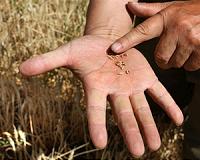 |
Washington (UPI) Sep 1, 2010 Rising carbon dioxide in the atmosphere may threaten climate change and be bad news for humans but poison ivy likes it, U.S. researchers say. A report in the journal Environmental Health Perspectives last year said the amount of CO2 in the atmosphere has grown by 22 percent since 1960, not so good for humans but great for poison ivy and other vines, The Washington Post reported Tuesday. In a study in Durham, N.C., a researcher simulated the carbon dioxide content in the air 50 years ago, today and -- using projections -- for the year 2050. "Tree seedlings grew 8 (percent) to 12 percent more, with more C02," Jacqueline Mohan, an assistant professor at the University of Georgia, said. "Poison ivy grew 149 percent more. Poison ivy is getting bigger, faster and nastier." Plants survive by converting carbon dioxide into carbohydrates through sunlight-fueled photosynthesis. "Vines are particularly adapted to take advantage of higher CO2 in the atmosphere," Mohan said, since they "can increase their rate of photosynthesis to make more green leafy tissue," which allows them to grow more and put out even more leafy tissue. Most people are allergic to the oil poison ivy produces, urushiol. The oil is present in all parts of the plant -- stems, berries and leaves -- during any season. "Even in dead poison ivy the oil is still active," Georgetown University professor of nursing and health studies Laura Anderko, said. The age of the plant doesn't matter. "The Japanese have a 500-year-old poison ivy specimen that can induce a rash," said Lewis Ziska, a plant physiologist with the U.S. Department of Agriculture.
Share This Article With Planet Earth
Related Links Farming Today - Suppliers and Technology
 Pakistani farmers in desperate need of wheat seeds: FAO
Pakistani farmers in desperate need of wheat seeds: FAORome (AFP) Sept 1, 2010 Pakistani farmers are in desperate need of wheat seeds for the next sowing season after floods devastated much of the country's farmland and seed stock, the UN's Food and Agriculture Organisation said on Wednesday. "Unless people get seeds over the next few weeks they will not be able to plant wheat for a year," said Daniele Donati, director for FAO emergency operations in Asia, the Middle E ... read more |
|
| The content herein, unless otherwise known to be public domain, are Copyright 1995-2010 - SpaceDaily. AFP and UPI Wire Stories are copyright Agence France-Presse and United Press International. ESA Portal Reports are copyright European Space Agency. All NASA sourced material is public domain. Additional copyrights may apply in whole or part to other bona fide parties. Advertising does not imply endorsement,agreement or approval of any opinions, statements or information provided by SpaceDaily on any Web page published or hosted by SpaceDaily. Privacy Statement |